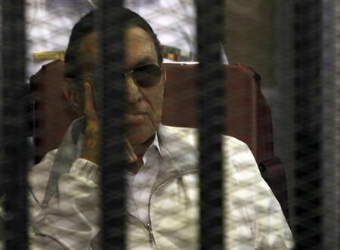An Egyptian court has decided to free former President Hosni Mubarak from prison. Outrageous as his release would be, there is a reason to hope it happens.
So far, nothing — not even a civilian death toll approaching 1,000 — has convinced Egypt’s liberal secularists of the error of their ways in supporting the military takeover of July 3. Watching the release of Mubarak, the dictator they risked their lives to remove just two years ago, just might help to change their minds.
Mubarak’s release remains uncertain. He was cleared in a corruption case but ordered to be held for 15 more days pending a separate investigation. He also faces charges of complicity in the murder of peaceful protesters in January 2011 in a retrial ordered by an appeals court. Still, a free Mubarak would be yet another piece of depressing evidence, if anyone needed one, that the Arab world’s most populous country isn’t headed for democracy.
Egypt’s liberals didn’t necessarily back the military’s coup out of revenge. They saw, not inaccurately, former President Mohamed Morsi’s elected government as autocratic. By throwing in their lot with the military, however, Egypt’s liberals took at least two huge gambles: First, that the generals, after 18 bruising months in power between Mubarak’s downfall and Morsi’s election, would have no appetite to rule; second, that in removing Morsi, the military would give Egypt’s Arab Spring a second chance.
These bets have gone horribly wrong. The military’s promises to restore democracy should be afforded the same credibility as its claims last week that it showed restraint in Rabaa al-Adawiya Square.
The alternative future is already apparent. On Aug. 18, security forces killed at least 36 Muslim Brotherhood detainees inside a police van. The next day, militants in the lawless Sinai Peninsula killed 26 policemen. The details of both incidents remain unclear, and it’s possible they are unrelated. But if the military is counting on its popular support to carry it through a campaign of eye-for-an-eye justice, then it may be sadly mistaken. Such campaigns are ultimately self-destructive.
The U.S. and Europe have little leverage to change the behavior of Defense Minister Abdelfatah al-Seesi and his fellow generals. Still, when the European Union’s foreign ministers meet to discuss Egypt on Aug. 21, they have to do better than reiterate cliched pleas for dialogue and restraint. They should instead refuse to release the bloc’s roughly 5 billion euros in pledged aid until the military frees Morsi and other Muslim Brotherhood leaders, and the two sides begin actual talks aimed at ending the violence.
Egypt’s allies in the Persian Gulf have said they will replace any aid Europe or the U.S. withdraws. That makes the role of Egypt’s liberals and media in changing the behavior of the military even more crucial. Popular support provided the generals with essential cover for the coup, and it remains extraordinarily valuable to them. Liberals should start setting limits.
More of them should follow the example of former nuclear negotiator Mohamed ElBaradei, who protested last week’s violence by resigning as interim vice president. Then they can start making more concrete and constructive demands: insisting that the military not extend emergency rule beyond a month, end its campaign to crush the Brotherhood by force, and hold early elections. In all of this, they should be able to count on support from the U.S. and Europe.
Democracy may be beyond reach in Egypt for now. But an end to the bloodshed need not be. It is on this goal that Egypt’s liberals should focus — because the rights and freedoms they cherish and deserve cannot take root amid a brutal military crackdown.
Source: Bloomberg



